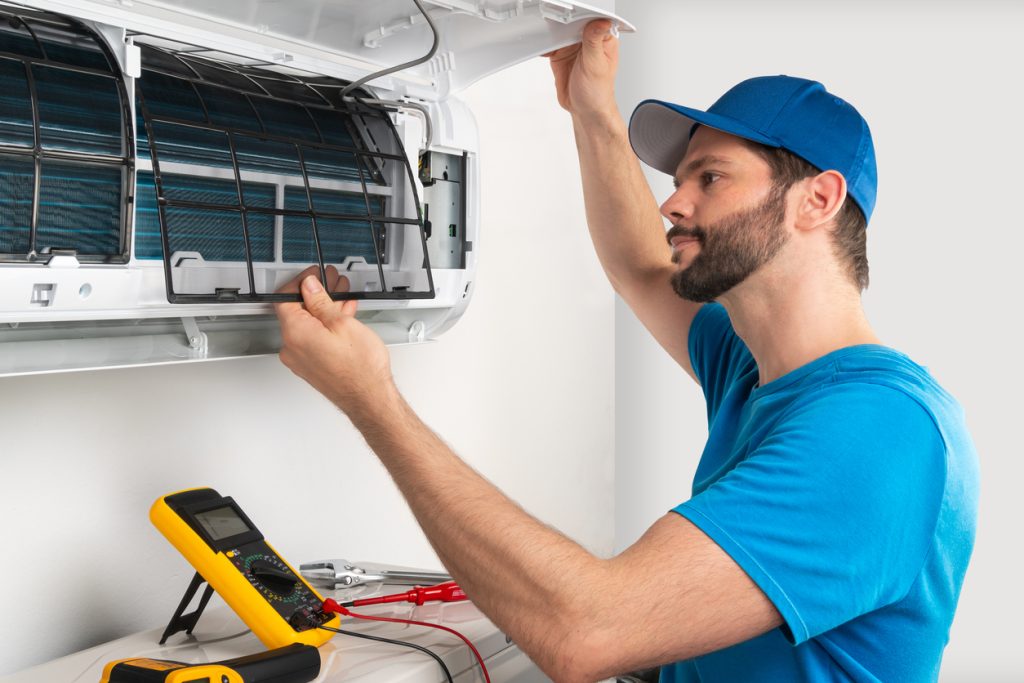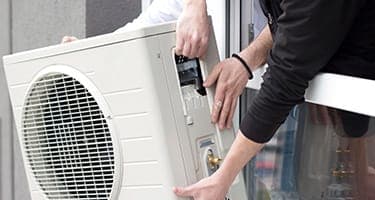The Main Principles Of Ac Repair Near Me
Air conditioning Repair Near Me: Expert Cooling System Remediation Guarantees Your Home Remains Comfortable All Year Round
Kinds Of A/c Systems
When tackling AC repair work, understanding the kind of cooling system you're handling can save time, cash, and irritation. Ever wondered why some units cool a space much faster than others? Or why particular systems seem to break down more often? Let's peel back the layers.
Central Air Conditioning
Some Known Details About Repair Air Conditioner Near Me
Imagine a cool breeze streaming through a whole house, whispering convenience into every corner. Central air systems do exactly that. They use a network of ducts to disperse cooled air, counting on a compressor and condenser outside, paired with an evaporator coil inside. However when this complex monster fails, pinpointing the problem can be like finding a needle in a haystack.
Split Systems

Split systems are a popular option for numerous homes-- part indoor unit, part outdoor compressor. They offer flexibility and efficiency, however their double nature means repair can involve either component. Have you ever heard an odd sound outside your home just to discover the indoor unit isn't cooling? That's a traditional indication of a split system glitch.
Some Known Factual Statements About Air Conditioning Repair Near Me
Window Units
These compact warriors battle summer season heat by fitting comfortably into a window frame. They combine all parts into a single box. Their simplicity often suggests less repair headaches, however overlooking filters or enabling debris buildup can result in lessened efficiency or breakdowns.
Ductless Mini-Splits
How Air Conditioner Repair Near Me can Save You Time, Stress, and Money.
Ductless systems bypass ductwork entirely, making them perfect for homes without existing ventilation. They're quiet, efficient, and remarkably resistant. Yet, when repairs are required, professionals read more should be proficient at handling refrigerant lines and electrical connections-- no small task.
Quick Reference Table
| Type | Secret Features | Common Repair Issues |
|---|---|---|
| Central Air | Ductwork, whole-house cooling | Duct leaks, compressor failure |
| Split System | Indoor & & outdoor units | Refrigerant leakages, fan motor concerns |
| Window Unit | All-in-one, easy setup | Unclean filters, electrical faults |
| Ductless Mini-Split | No ducts, zoned cooling | Line leakages, sensing unit breakdowns |
7 Simple Techniques For Air Conditioning Repair
Deciphering the Most Frequent Air Conditioner Issues
Have you ever wondered why your a/c unexpectedly stops cooling during a sweltering afternoon? One typical culprit is an unclean or clogged air filter. This sly villain limits air flow, requiring your system to work overtime, which not just reduces effectiveness but can also cause premature breakdowns. Imagine trying to breathe through a scarf taken in dust-- it's tiring!
Another frequent misstep is refrigerant leaks. These unnoticeable leaks do not simply decrease cooling power but can also harm the compressor, the heart of your air conditioner system. How typically do you check for unusual hissing noises or ice development on the coils? Capturing these indications early can conserve you from expensive repair work down the line.
Beyond the Essentials: Lesser-Known Issues
Little Known Questions About Air Conditioning Repair.
Often, the thermostat itself is the nuisance. Miscalibrated or faulty thermostats send out mixed signals, causing the air conditioner to cycle unpredictably. Ever knowledgeable your AC turning on and off in fast succession? That's called brief biking, a sneaky performance drainer that can break parts quicker than you 'd anticipate.
Electrical issues, such as worn electrical wiring or a malfunctioning capacitor, might hide beneath the surface area. Air Conditioning Repair. These frequently manifest as air conditioning units stopping working to start or unexpectedly closing down. A professional eye understands to evaluate these parts with accuracy tools, something a casual glimpse won't reveal
Specialist Tips for Diagnosing Common AC Issues
The Ultimate Guide To Ac Repair
- Inspect and replace air filters frequently-- every 1 to 3 months depending on usage and environment.
- Listen for unusual sounds like rattling or buzzing that might signify loose parts or electrical faults.
- Check the outside system for particles or blockages that impede airflow and trigger overheating.
- Look for frost buildup on evaporator coils, a tip towards refrigerant issues or air flow constraints.
- Check the thermostat settings and recalibrate if the temperature readings feel off.
Quick Referral Table: Manifestation & & Probable Triggers

| Sign | Probable Cause | Professional Idea |
|---|---|---|
| Warm air blowing | Low refrigerant or unclean coils | Tidy coils and examine for leakages right away |
| Short biking | Thermostat problems or oversized system | Change thermostat settings and seek advice from sizing guidelines |
| Unit will not start | Electrical faults or capacitor failure | Test circuitry and replace capacitors as required |
| Water leakage | Obstructed drain line or frozen evaporator | Clear drain lines and check for coil icing |
DO IT YOURSELF A/c Maintenance Tips
The Facts About Air Conditioning Repair Near Me Revealed
Ever observed your a/c unit sputtering like an old engine on a hot summer season day? Overlooking subtle indications typically means more than simply a sweaty afternoon-- it's a prelude to unexpected AC repair work costs. However what if you could capture those whispers before they develop into wails? Routine DIY upkeep can be your first line of defense.
Easy Steps to Keep Your Air Conditioning Running Smoothly
What Does Fix Air Conditioner Mean?
- Clean or Change Filters: A blocked filter is like trying to breathe through a headscarf. Every 1-3 months, check and swap out your filters. It enhances airflow and efficiency, avoiding compressor stress.
- Inspect the Condenser Coils: Dust and debris function as invisible blankets smothering your system's cooling power. Gently brush or vacuum the coils, but prevent severe chemicals that might wear down the metal.
- Check the Drain Line: When was the last time you glimpsed at your drain pan? A clogged drain can trigger water leakages and foster mold growth. Flushing it with a vinegar solution month-to-month keeps the flow clear.
- Seal and Insulate: Are your ductworks whispering leakages? Sealing gaps with mastic or foil tape enhances effectiveness and cuts down on irregular cooling.
Pro Tips Beyond the Essentials
- Step your system's voltage to capture subtle electrical wear before it sparks huge problems.
- Listen for uncommon hums or rattles-- these acoustic breadcrumbs typically indicate loose parts or failing motors.
- Keep outside units shaded however make sure a minimum of two feet of clearance around them for ideal air flow.
Ask yourself: Are you hearing your air conditioner's quiet SOS or just waiting on it to yell? Taking time for DIY AC upkeep transforms reactive repair into proactive care, conserving sweat, stress, and yes, money.
The 9-Minute Rule for Air Conditioner Repair Near Me
Why Knowledge in AC Repair Matters
Picture this: your air conditioning unit sputters and groans throughout a scorching afternoon, leaving you sweltering inside your home. Would you rely on a novice fumbling with fragile parts, or would you seek the reassurance of a expert a/c professional!.?.!? The intricacies of modern air conditioning systems require precision and experience. A minor miscalculation can intensify a small malfunction into a costly catastrophe.
About Air Conditioning Repair
Hidden Complexities Behind the Cool Breeze
Many underestimate the layers hidden beneath the smooth outside of an a/c unit - AC Air Conditioner Repair. From refrigerant leakages that calmly drain pipes efficiency to malfunctioning thermostats that misread temperature levels, these issues require more than a fundamental toolkit. Professionals have an eager eye for diagnosing problems that balance property owners overlook
Essential Tips for Choosing the Right Specialist
An Unbiased View of Air Conditioning Repair Near Me
- Accreditation and Training: Verify credentials; a professional trained in the most current a/c innovations is important.
- Experience with Specific Systems: Not all AC systems are developed equivalent; find someone familiar with your model's quirks.
- Diagnostic Approach: Proficient specialists utilize sophisticated tools-- like electronic leak detectors and thermal imaging-- to identify surprise faults.
What to Get out of a Pro's Diagnostic Process
| Action | Purpose | Professional Insight |
|---|---|---|
| Visual Evaluation | Recognize obvious wear or damage | Try to find deterioration or uncommon noises-- a telltale sign typically ignored |
| Pressure Checking | Discover refrigerant leaks | Subtle pressure drops can mean micro leaks undetectable to the naked eye |
| Electrical Checking | Guarantee circuit integrity | Loose connections can simulate serious mechanical failures |
The Ultimate Guide To Ac Air Conditioner Repair
Why DIY Typically Falls Short
Tempting as it is to play with your air conditioner unit, DIY repairs often miss the root cause. Topping off refrigerant might temporarily cool your space but overlooks leaks that worsen over time. Expert technicians do not simply patch signs; they hound the underlying mechanical and electrical faults that sap efficiency.
Facts About Air Conditioning Repair Uncovered
Questions to Ask Before Working with
- What diagnostic tools do you use to determine problems?
- Can you describe the repair procedure and expected results?
- Are you acquainted with the refrigerants compatible with my system?
- Do you follow security procedures for handling electrical components?